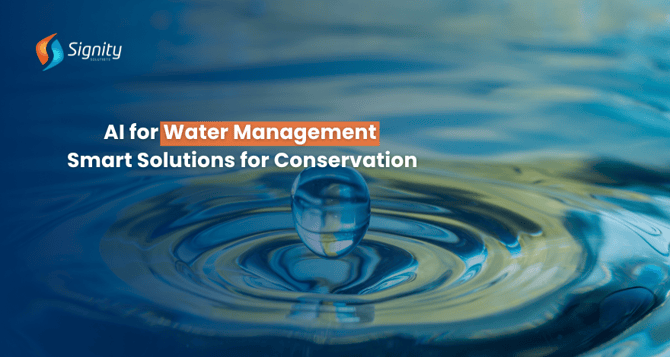AI for Water Management: Smart Solutions for Conservation
AI is revolutionizing water management by providing smart solutions for conservation and efficient resource use. Key applications include predictive analytics for water demand, leak detection, optimized agricultural irrigation, water quality monitoring, and smart water grids.

Water scarcity is a global challenge that requires innovative approaches for sustainable management. Artificial Intelligence (AI) is emerging as a powerful tool in water management, providing smart solutions for conservation and efficient resource utilization. In this article, we will explore the significance of AI in water management, discuss how smart technologies can contribute to effective conservation efforts, and highlight the role of AI development companies in advancing these innovations.
The Water Scarcity Challenge
Water scarcity is a pressing issue affecting communities, agriculture, and ecosystems worldwide. The demand for water is increasing due to population growth, urbanization, and changing climate patterns. Effective water management is essential to address this challenge and ensure the sustainable use of this vital resource.
Leveraging AI in Water Management
Predictive Analytics
AI algorithms can analyze historical data, weather patterns, and usage trends to predict future water demand. This enables water authorities to plan and allocate resources more effectively, preventing shortages and optimizing distribution.
Leak Detection
Smart sensors and AI can be employed to detect leaks in water infrastructure. Machine learning algorithms analyze data from sensors to identify anomalies, allowing for early detection and timely repair of leaks and reducing water wastage. This is a key component of any smart water management system.
Optimizing Irrigation in Agriculture
AI-driven systems can optimize irrigation practices in agriculture by analyzing soil moisture levels, weather conditions, and crop characteristics. Precision irrigation reduces water usage, increases crop yield, and minimizes environmental impact.
Water Quality Monitoring
AI technologies, including machine learning models, can analyze water quality data in real-time. This allows for early detection of contaminants and pollutants, enabling rapid response measures to protect water sources.
Smart Water Grids
Intelligent water distribution systems use AI to adjust water flow and pressure dynamically based on demand. This ensures efficient distribution and minimizes energy consumption in pumping stations, embodying the principles of a smart water management system.
Water Demand Prediction Technical Implementation with Node.js
Let's explore a simplified Node.js example for water demand prediction using historical data:
const express = require('express');const bodyParser = require('body-parser');const { LinearRegression } = require('machinelearn/linear_model'); const app = express();app.use(bodyParser.json()); app.post('/predict-water-demand', (req, res) => { const { historicalData } = req.body; const reg = new LinearRegression(); const X = historicalData.map(data => [data.year]); const y = historicalData.map(data => data.demand); reg.fit(X, y); const prediction = reg.predict([[new Date().getFullYear() + 1]]); res.json({ prediction: prediction[0] });}); app.listen(3000, () => { console.log('Server is running on port 3000');}); |
In this example, the server exposes an endpoint (/predict-water-demand) that takes input data and uses linear regression to predict future water demand.
Benefits of AI in Water Management
Efficiency
AI enables real-time monitoring and adaptive control, optimizing water distribution systems for efficiency.
Cost Savings
Predictive analytics and leak detection technologies can result in significant cost savings by preventing water losses and minimizing infrastructure damage.
Environmental Conservation
Smart water management contributes to environmental conservation by reducing over-extraction, minimizing pollution, and preserving ecosystems.
Data-Driven Decision Making
AI empowers water authorities with actionable insights, enabling informed decision-making for long-term planning and resource allocation.
Resilience to Climate Change
By predicting and adapting to changing weather patterns, AI helps water management systems become more resilient in the face of climate change.
Conclusion
AI is a game-changer in water management, providing smart solutions for conserving and using water sustainably. As technology advances, integrating AI into water management is crucial for tackling global water scarcity.
 Leveraging these technologies can create a more resilient and efficient water infrastructure, ensuring a sustainable water supply for future generations.
Leveraging these technologies can create a more resilient and efficient water infrastructure, ensuring a sustainable water supply for future generations.



.png?width=344&height=101&name=Mask%20group%20(5).png)

















